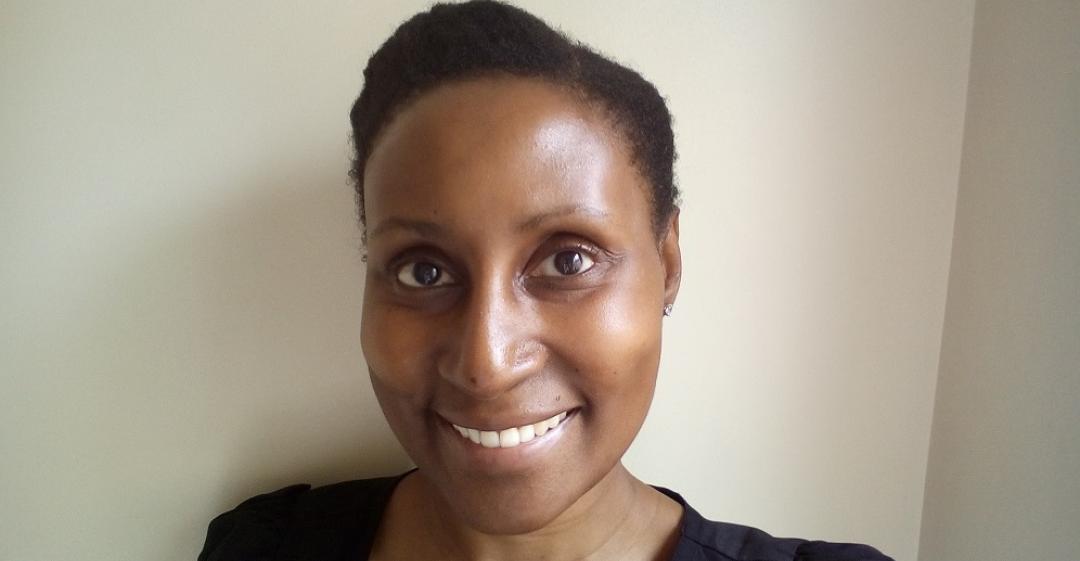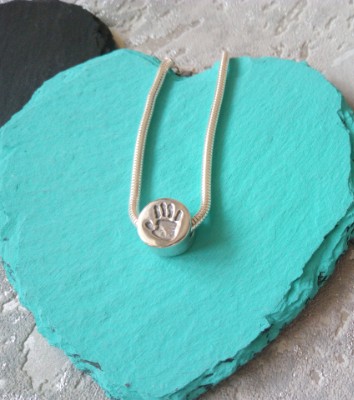“I never seemed to get to a place where I was coping.”

What work were you doing previously?
Before starting my business, I worked full-time as a primary school teacher.
What are you doing now?
Most of my time is now spent running my business from home.
I create keepsakes, in the form of fingerprint, handprint and footprint jewellery. I capture the actual prints of loved ones for people to wear as a piece of jewellery, whether that's a necklace, bracelet, pair of cufflinks or keyring – there's something to suit all tastes.
I also work, when it suits me, as a supply teacher.
How did you feel in your work before you decided to make the change?
I was stressed out and extremely unhappy with my working life.
I used to spend long hours commuting each day and had to take a lot of work home with me. I was constantly tired, always getting colds and recurring tonsillitis. I wasn't sleeping well and had become very tearful.
Why did you change?
My weekends were spent marking and assessing students work.
I felt I didn't have any time to dedicate to my son, who was only a year old at the time. I felt incredibly guilty that I'd sometimes leave him at his Nan's just so I could finish my school work to be ready for the week ahead.
I never seemed to get to a place where I felt I was coping and on top of everything.
When was the moment you decided to make the change?
Eventually the situation started to affect my family, and this is when I knew I had to make a change.
I was becoming irritable and taking it out on my nearest and dearest. Looking back now I can see just how stressed I'd become – it was changing me as a person.
In addition, my son was getting bigger and I felt like I was missing out on being able to spend quality time with him. He needed me; I came to realise that if I didn't make the change now, whilst he was still young, I'd be missing out hugely on being present in his life when he still depended on me.
How did you choose your new career?
I've always had an interest in being creative.
Before I became a teacher, I worked in the fashion PR industry as a PR junior for a couple of years. This was after graduating with a BA Honours Degree in Fashion with Business. I'd also studied Fine Art and Textiles at college.
I knew I wanted to start my own business which I could steadily grow, whilst having the flexible security of an income from my profession. I did a lot of research into different franchises aimed at people with children. Many of these businesses required a big financial outlay and monthly expenses, which put me off.
Then, I came across a company, The Keepsake Association, that was nothing like a franchise but still offered training and business start-up support.
Are you happy with the change?
I'm over the moon.
I took the plunge to start my business and create a better life for myself and my family. I haven't looked back and I can honestly say that leaving full-time teaching to pursue my own business venture has been the best thing I've done for both my career and well-being .
What do you miss and what don't you miss?
I do miss the camaraderie between teachers.
Supply teaching can be lonely, but I love that it's given me the freedom to fulfil my dream of having my own business.
I don't miss bringing work home, or having to do work at weekends and during the holidays.
Now, I get to leave work at work. When I'm home I can focus on my family and business. Plus, I love the flexibility of running my business from home, meaning I can fit it around my home life. I can work on my business when my son's at school or has gone to bed.
How did you go about making the shift?
Making the shift was easy once I'd left full-time teaching and switched to supply teaching.
Doing this gave me the time (especially in the evenings and at weekends) to work on my business. There were no more books to mark or planning to do, so I had ample time to focus on starting my business.
What didn't go well? What wrong turns did you take?
Initially, I wanted to do everything in regards to creating keepsakes, and it was too much.
I was still perfecting my jewellery-making techniques while trying to acquire new skills in hand and foot castings, and clay impressions. Eventually, I stopped and decided to concentrate solely on jewellery making. I realised that being really good at one thing – learning how to market and sell one product that you're highly skilled at making – is the best way to start when creating handmade products.
Extending my product range could come later, once I felt I'd achieved my initial goal.
How did you handle your finances to make your shift possible?
I realised that whatever I chose to do, I'd still need some kind of income coming in.
It was important to me to still be able to contribute to my family financially. So, I decided to reduce my teaching hours by switching to supply teaching.
Initially, I was working Monday to Friday. Now that my business has grown, I can afford to work 2–3 days doing supply and the rest of the week I work from home on my business.
I've grown my business gradually to fit around my financial commitments to my family. This has worked well for me.
What was the most difficult thing about changing?
I think people's reactions were the toughest thing to handle.
My close friends and family have always been supportive; because they know me, they've understood I've always had a love for creativity. Others that don't know me so well were surprised to hear that I was leaving a secure, well-paid, full-time teaching position to start my own handmade jewellery business.
People seemed to feel that I was going 'backwards' in terms of my career progression, whereas I knew it was something I had to try as I wasn't happy in my current job. I wanted to do something I knew would make me happy, make me money and make my family life happier.
What help did you get? 
I trained with The Keepsake Association.
The owner had previously run her own successful keepsake company and wanted to share her expertise and allow others to do the same. I paid for a course in Fine Silver Clay, Fingerprint and Handprint / Footprint Jewellery and was taught everything I needed to immediately start making and selling my range.
I'm still a member of The Keepsake Association and continue to receive business support and advice from them, which has been invaluable in growing my business.
What resources would you recommend to others?
Youtube videos of people starting their own handmade businesses have been good for getting an insight into other people's personal experiences.
I attended the National Franchise Exhibition in Birmingham prior to starting my business, and spoke to many people there who were already running franchises. Although I decided against the franchise route, I found it useful finding out how others had started and the kind of support they were receiving.
Local business networking groups have also been fantastic, not only in offering business help and advice but also for networking with local, like-minded individuals.
What have you learnt in the process?
I've learnt to be focused and self-disciplined.
When you're self-employed, you can easily become distracted as you have no-one but yourself to answer to. I've found having weekly goals has helped me stick to a plan.
I've also learnt to be better at organising my paperwork. Now, I complete my tax return well in advance to save myself from last-minute stress!
Enjoyment in the process of establishing and running my business has been hard to maintain, but I've learnt that it's important to enjoy every step and remember why I started my business in the first place.
What would you advise others to do in the same situation?
My number one piece of advice would be to ensure that you have the backing of your partner, if you're in a long-term relationship, or the full support of someone close to you whom you trust.
This is because there'll be many emotional ups and downs. When starting your own business, some days you'll be on cloud nine and other days you'll feel like giving up, so having someone who can be your support system will help see you through any tough times that lay ahead.
Also, I'd advise being realistic in your plans and forecasts of how much money you'll be making. Promoting your business will take as much time as making the products you sell. It will take time and money to market your business and this will be an ongoing expense. Make sure you have the finances to sustain this initially and realise that in order to grow your business, you need to advertise it, whether through something like ads on Google or Facebook, or promoting it via social media.
Keep going and set realistic goals. I find that quarterly goals, broken down into sub-goals for each week and month, works best for me and allows me to see the progress I'm making. This gives me that boost to work even harder the following month.
To find out more about Loretta's business, visit www.truelovekeepsakes.co.uk.
What lessons could you take from Loretta's story to use in your own career change? Let us know in the comments below.



